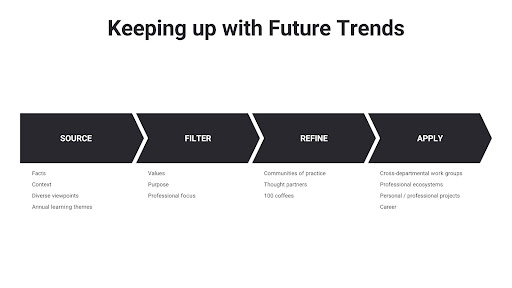How to Keep Up With Future Trends

How do you keep up with all the latest future trends?
It's a common question.
Part of it is that it's my job so I prioritize and invest in it.
I don't have to manage a hundred people, make decisions on compensation policies or do performance reviews. We are a small SWAT team of people who spend our time solely focused on getting companies and individuals future ready.
Still the question was a good one and it made me think, amid a torrent of information.
How can you decide where to get your information, filter it, and what to do with that information for your career or business?
I’ve put it into a rough framework [SOURCE | FILTER | REFINE | APPLY] to help you refine your own ability to sort information, keep and stay relevant.

SOURCE
For the top of the funnel, I work to curate a trusted set of resources that I find interesting, that have new viewpoints and are a combination of facts but also context. I do a tremendous amount of reading, listening, and periodic culling of research, podcasts, and newsletters that I try to get from a global set of different perspectives.
FILTER
I filter based on my focus and my focus comes from my overarching values of learning, growth, and strengthening communities.
Emerging trends like technology (AI, the metaverse, blockchain, robotics), or larger drivers like demographics and climate change, are filtered through those three values.
Every year I also focus on a theme. Last year was metaverse. This year is sustainability. It's not that I won't learn anything outside but I choose something to invest more deeply in and it often has to do with a client or project I’m working on.
The second filter is my professional focus, my WHY, which is finding better ways to work. How does any trend apply to our deep seated needs for personal growth and professional growth, collaboration, belonging, identity and status?
The third is my professional focus, which encompasses individual and company consulting and our Future Proof community.
If I look at self-driving cars, I don’t think about the future of the auto industry, I ask, “how will that change the way we work?”
For example, I have been tracking the rise in work ecosystems so think about how that might benefit the C-suite clients who are looking to zip up the curve when they are at a strategic inflection point. How can they use those trends to build, borrow or buy growth and innovation?
I also consider how it might benefit at an individual level for the Future Proof community. How can they leverage this trend to make more impact and create their inspiring futures?
COLLABORATE
How do you make sense of the information you have?
In order to delve deeper into ideas, I like to speak to other people to understand their perspective and have a chance to articulate my own. I am part of a number of groups like the Association of Professional Futurists, Future Work Forum and of course my own Future Proof community.
In these regular communities of practice, people talk about their methodology and approach. For example, an AI expert on implications for the future of work and we discuss, bringing to bear our own experiences. For the Future Proof community, we’ve had experts ranging from web3 to happiness in our Masterclass series and now have taken that internally so that we can have more discussion and sense-making.
Another key aspect of refinement is individual thought partners. We tend to think of teams or groups for collaboration vs individuals in our network. Do you have a regular thought partner or accountability partner that you can talk to about mutual interests?
That's a lesson I learned early on from my first boss, Henry Kissinger, who demonstrated to me the power of having many different conversations to refine one’s thinking. As Saleema Vellani shared in our Future Proof Masterclass, to go deeper in a topic, have 100 coffees. Folks in our Future Proof community have used that to learn about web3, shifting to non-profit roles or even using it as a way to settle into a new city.
APPLY
The application of new ideas is where you can test how it integrates into your wider world. The ability to take small bets and experiment, as noted in my Future Proof book, is useful here.
I think about the frameworks and projects that I work on.
For example, if I read something on scanning the horizon, values, narrative or network, I might share it, upgrade the reading in our course if it seems quite timeless or invite a thought leader to have a conversation and one of our Future Proof fireside chats.
Another example, a CEO who I worked with was quite keen to focus the company on web3 which he saw as a big opportunity for their business. He invited a small group of enthusiasts across the business to join a company working group. Some of these people were not in positions of authority but were passionate and had on their own time then engaged in web3. Each person would put interesting links and articles into the group chat or email, then talk about why it was important, what effect it might have on the business, and what kind of business opportunities it might yield. During monthly chats, they might have an opportunity to discuss how they could take one of those and run an experiment on it.
This signal gathering process is a classic foresight process. You can see an old one that I did with some of my Institute for the Future colleagues below and I’m happy to speak to you more if you want to implement it in your own company.

You can do it in your own life as well. You can go from reading an article to reading a book, taking a class, joining a discussion group or just finding ways to incorporate it into your existing work.
If you find yourself fascinated about synthetic biology, ask, “what is one small experiment that I can run to see if this is something that I'm interested in further?”
Full disclosure, I’m reading Amy Webb’s book, The Genesis Machine: Our Quest to Rewrite Life in an Age of Synthetic Biology, and lapping it up.
I filter it through, “how is this going to change the world of work?” How is this going to enable better communities, learning and growth. No plans to go into synthbio now but I’ve already incorporated it into my writing about the future of work and I think it'll have a huge effect.
So that's my way of obtaining information, filtering, refining and applying to keep up with future trends. I hope it's useful to you as you try to make sense of the tsunami of information we have at our fingertips.
If you liked this content, please don't forget to share this to your friends and sign up to our newsletter to receive news on future of work trends, future proofing yourself and your career and exclusive invites to our events and masterclasses.

